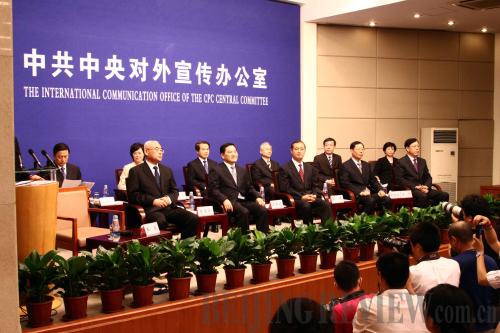|
 |
|
AUTHORITATIVE SOURCES: Spokespersons from 11 departments of the Central Committee of the Communist Party of China make their media debut on June 30, 2010 (GAO XUEYU) |
Winning 862 votes from the 877 delegates to the Communist Party of China (CPC) provincial congress in east China's Jiangsu Province on May 14, Cheng Junrong, a 34-year-old migrant worker at a factory production line, was elected as one of 2,270 delegates to the 18th CPC National Congress to be held in November.
Cheng is the province's first migrant worker delegate elected to a CPC national congress.
Cheng, who grew up in a village near Jiangsu's provincial capital of Nanjing, has been working at a Nanjing-based machinery maker after finishing junior middle school in 1994.
"I was a little surprised when I was elected. As one of our country's hundreds of millions of migrant workers, I consider it a great honor," he told Xinhua News Agency in June.
Cheng's election came after undergoing multiple procedures, including the nomination of candidates, qualification checks, public notification of the candidates, short listing and final voting.
The process began with 22,718 grassroots Party organizations under the CPC Nanjing Municipal Committee nominating 7,375 people as candidates.
After selections by CPC committees at various levels, the CPC Nanjing Municipal Committee worked out a nomination list of seven people, including Cheng, for the provincial Party committee.
The CPC Jiangsu Provincial Committee then put 81 candidates, including two nominated by the CPC Central Committee, up for a final vote at the provincial Party congress.
Finally, 70 delegates to the CPC national congress were elected with the candidates outnumbering the elected delegates by 15.7 percent, higher than the minimum of 15 percent required by the CPC Central Committee.
As one of his factory's top technical experts, Cheng has been honored several times as a national and provincial model worker.
Cheng's colleagues were not at all surprised by his election. "He was the first to come to our mind when we were nominating candidates from Party members in our factory," said Cheng's co-worker Zhang Mingguan. "He has never looked down on himself for being a migrant worker. He has worked his way up today by constantly improving himself."
"Cheng is also a deputy to the National People's Congress, so he is experienced in giving suggestions regarding social and political issues," said the factory's CPC committee secretary Xu Ketang. The National People's Congress is China's top legislature.
The CPC has pledged to increase the representation of grassroots organizations and groups, such as migrant workers, at the national congress.
The minimum proportion of grassroots delegates will be 32 percent, 2 percentage points higher than that of the previous congress in 2007, said the Organization Department of the CPC Central Committee in November 2011. It also required that worker delegates should account for no less than 10 percent of the total and be made up of workers from public and private enterprises in industrial and service sectors.
In Jiangsu Province, delegates from grassroots Party organizations account for 38.6 percent of the total, including Cheng and eight other workers.
"The election results show that the CPC Central Committee has attached more importance to giving a greater voice to grassroots Party members," Cheng said. "I'll do my job well as a delegate to the CPC national congress and make suggestions on behalf of migrant workers."
Competitive election is one of the many institutional reforms the 91-year-old CPC has launched to better enhance itself.
On June 30, 2010, spokespersons from 11 departments of the CPC Central Committee made a group debut at a press conference in Beijing.
"The CPC Central Committee has paid special attention to disclosing information about Party affairs," said Wang Chen, Minister of the International Communication Office of the CPC Central Committee, at the press conference.
Wang said that publicizing Party affairs information is a major focus of the CPC's work.
Another major effort the Party has made to boost intra-Party democracy is the enlarged trials on the open nomination and direct election of Party officials over the past five years. Before the trials, most Party officials were appointed by higher-ups.
| 